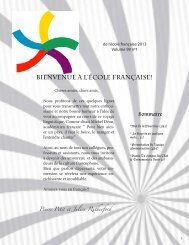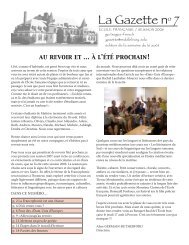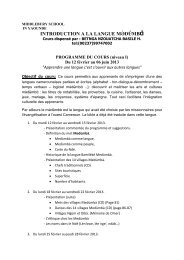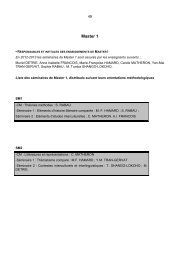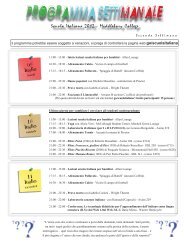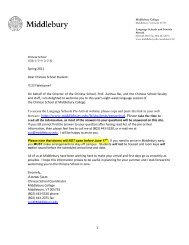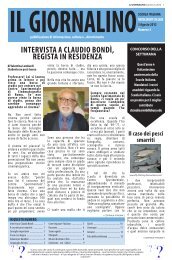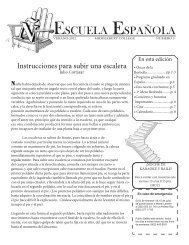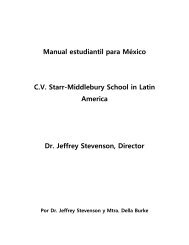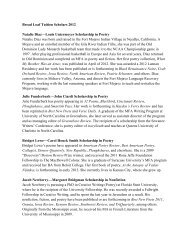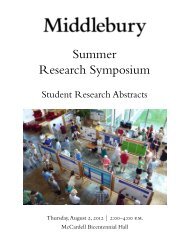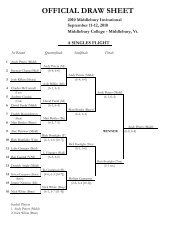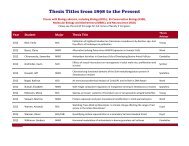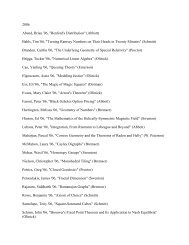2010 Catalog - Middlebury College
2010 Catalog - Middlebury College
2010 Catalog - Middlebury College
Create successful ePaper yourself
Turn your PDF publications into a flip-book with our unique Google optimized e-Paper software.
7295a Introduction to Milton/Ms. Spiller/M, W 2–4:45<br />
This course will provide an introduction to the writings of John<br />
Milton. We will focus primarily on Milton’s great epic, Paradise Lost,<br />
with additional readings from his controversial prose (“Areopagitica,”<br />
“Tenure of Kings and Magistrates” and “Christian Doctrine”) and<br />
from the writings of contemporaries such as Thomas Hobbes, Margaret<br />
Cavendish, and René Descartes. If time allows, we will end the course<br />
with a look at Philip Pullman’s fictional meditation on Milton, science,<br />
and theology in The Golden Compass. We will explore Milton’s deep<br />
interest in contemporary science and philosophy, as well as his often<br />
idiosyncratic theology and impassioned politics. Why do Milton’s angels<br />
eat? In what ways is Satan a Hobbesian? How does the Son create the<br />
earth out of the matter of Chaos with his Golden Compass and what<br />
does that have to do with Milton’s insistence that man has free will?<br />
Why is reading books, both good and bad, necessary in “Areopagitica,”<br />
but eating the fruit of the tree of knowledge disastrous in Paradise Lost?<br />
These are scientific, philosophical, and theological questions, but we<br />
will see how, for Milton, they are ultimately also aesthetic questions<br />
that shape both the vital creation that is his poem and our acts of<br />
reading it.<br />
Texts: John Milton, Complete Poetry and Essential Prose, ed. William<br />
Kerrigan, John Rumrich, and Stephen Fallon (Modern Library);<br />
Thomas Hobbes, Leviathan (Hackett); Margaret Cavendish, The Blazing<br />
World and Other Writings (Penguin); René Descartes, Discourse on<br />
Method (Penguin); Philip Pullman, The Golden Compass (Laurel Leaf).<br />
Group III (English Literature since the<br />
Seventeenth Century)<br />
7310 The English Romantics: Wordsworth and Keats<br />
Mr. Sharp/T, Th 2–4:45<br />
This course will study the poetry and prose of William Wordsworth<br />
and John Keats, focusing on their complex artistic visions, which will<br />
be illuminated by bringing the two poets—one from the first generation<br />
of English Romanticism, the other from the second—into fruitful<br />
dialogue. We will pay special attention to the nature of the imagination<br />
and creativity; the function of poetry; the relationship between the<br />
perceiving mind and nature; the status of spirituality and transcendence;<br />
the nature of human identity and development, of the self and its<br />
relationship with larger human communities.<br />
Texts: William Wordsworth: The Major Works, ed. Stephen Gill (Oxford<br />
World’s Classics); The Prelude: 1799, 1805, 1850, ed. Jonathan<br />
Wordsworth, M.H. Abrams, and Stephen Gill (Norton Critical Ed.);<br />
John Keats: Complete Poems, ed. Jack Stillinger (Belknap/Harvard);<br />
Selected Letters of John Keats, ed. Grant F. Scott, rev. ed. (Havard).<br />
Students at the top of Looking Glass Mountain outside Asheville.<br />
7410b James Joyce/Mr. Donadio/T, Th 2–4:45<br />
A sequential reading of the major works of fiction (excluding Finnegans<br />
Wake), moving from the understated intricacies of Dubliners to the<br />
more emphatic design of A Portrait of the Artist as a Young Man to the<br />
comprehensive schematic and stylistic ambitions of Ulysses. There<br />
will be opportunities for independent research into the author’s lesser<br />
known fictions (e.g., Stephen Hero, Giacomo Joyce) as well as his work<br />
in other genres (poetry, drama, literary criticism), and students have a<br />
standing invitation to relate these other writings to the principal texts<br />
under scrutiny. At some point before the summer, anyone who has not<br />
yet encountered Ulysses is encouraged to form a first acquaintance with<br />
the work by venturing into it directly, as its initial readers managed<br />
to do, without the assistance of detailed guidebooks and other critical<br />
apparatus.<br />
Texts: James Joyce, Dubliners (Oxford World’s Classics); A Portrait of<br />
the Artist as a Young Man (Oxford World’s Classics); Ulysses, ed. Hans<br />
W. Gabler (Random House). Optional (and available on reserve in the<br />
library): Richard Ellmann, James Joyce (Oxford); Don Gifford, Ulysses<br />
Annotated (California); or Harry Blamires, The New Bloomsday Book<br />
(Routledge).<br />
Group IV (American Literature)<br />
7583 Memory in African American Public and Literary<br />
Discourse/Ms. Moss/M, W 2–4:45<br />
Though memory or “memoria” was one of the original five canons of<br />
rhetoric, until recently it was one of the forgotten canons. However,<br />
memory has reemerged as an important element in rhetorical studies,<br />
literary criticism, and other disciplinary areas. Of interest to many<br />
scholars is how memory is used in particular cultural texts. In this<br />
seminar, we will examine how the art and practice of memory functions<br />
in African American texts from a variety of genres and media. Specifically,<br />
we will look at contemporary black political discourse, novels, poetry,<br />
plays, and film. Students will be asked to think about how race as well<br />
as a community’s history, beliefs, and cultural practices shape the<br />
functions and uses of memory in a text. Questions that we will consider<br />
include: How is collective and/or cultural memory used as a persuasive<br />
device? What is the relationship between memory and political action?<br />
Who has the right to invoke memory? What impact might genre have<br />
on the place of memory in a text? Texts will include a course packet of<br />
critical readings on memory (from classical rhetoric to contemporary<br />
theories); political speeches from Martin Luther King, Jr., Barbara<br />
Jordan, Barack Obama (and others); and the works listed below:<br />
Texts: Harriet Jacobs, Incidents in the Life of a Slave Girl (Norton Critical<br />
Ed.); Toni Morrison, Beloved (Vintage); Julie Dash, Daughters of the<br />
Dust (film); August Wilson, The Piano Lesson (Plume); James McBride,<br />
The Color of Water (Riverhead); Spike Lee, When the Levees Broke<br />
(documentary; both this and Daughters of the Dust will be available for<br />
viewing at Bread Loaf, but I recommend that you try to see both if<br />
you can before the summer).<br />
17<br />
NORTH CAROLINA



